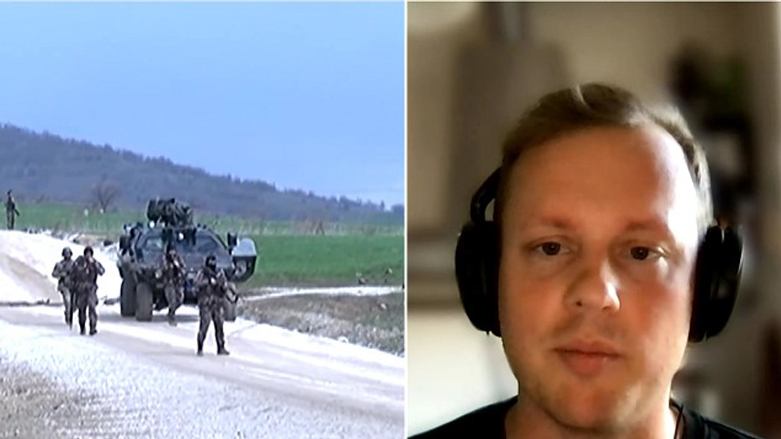'Erbil attacks aim to influence KRG position on Iraqi government formation': Security Expert
"We see the Iran-backed militias and the Kurdistan Workers Party (PKK) trying to destabilize the security situation and hinder the formation of an effective and reformist government."

ERBIL (Kurdistan 24) - Lukas Andriukaitis, the Associate Director at the American Atlantic Council's Digital Forensic Research Lab (DFRLab), discussed the threat outlawed armed militias pose to the Kurdistan Region and Iraq in an exclusive interview with Kurdistan 24.
"Obviously, there are endeavors to destabilize the political and security situation of Iraq, particularly following the elections and the start of the government formation process," Andriukaitis told Kurdistan 24. "In time, Iraq needs to make political and security reforms. We see the Iran-backed militias and the Kurdistan Workers Party (PKK) trying to destabilize the security situation and hinder the formation of an effective and reformist government."
Andriukaitis warned that the armed militias are a major growing threat to Iraq's security that Baghdad needs to deal with carefully.
"Both Iran and Turkey might have an interest in continuing the militia's presence in Iraq. This is why Iraq needs to deal with the situation carefully," he said.
He emphasized that "the Iraqi Federal Government and the Kurdistan Regional Government (KRG) need to have strong cooperation to tackle the threat of the outlawed militias who are destabilizing the security situation of Iraq and the Kurdistan Region."
"This issue needs to be taken seriously because it affects the stability of the neighboring countries," he added. "The coalition countries such as the United States can cooperate on the military and intelligence side to put an end to the militias in Iraq."
"There is a direct connection between the Iraqi government formation and the increase in the militias' attacks on Kurdistan Region and Iraq," Andriukaitis underlined.
"The militias want to practice influence on the government and impose their will, similar to what Harakat Hezbollah al-Nujaba (Movement of the Party of God's Noble Ones) does in Syria and Lebanon," he said.
By attacking Erbil, the militia groups sought to influence the Kurdistan Regional Government's (KRG) stance on government formation in Baghdad.
"The US presence in the Kurdistan Region and the area is very important to keep the balance," Andriukaitis said. "The stronger this presence is, the better the US can help protect Kurdistan from these militias."
Andriukaitis pointed out that the US has been protecting the Kurdistan Region by supporting it in the fight against ISIS and providing it with training and military equipment.
"The US support for Kurdistan Region strengthened the region's position and enabled it to defeat ISIS," he added. "More cooperation between the US and Kurdistan Region means more protection for the region."
He warned that the biggest threat to Iraq's future is its instability.
"If these militias remained strong and active in Iraq, it will not only pose a threat to Iraq but to the neighboring countries as well," he said.
"The militias' presence will continue to be a threat to the stability of the Kurdistan Region, which is the safest part of Iraq and a good example of democratic and economic development in the Middle East," he added.
"To protect this, these groups need to be controlled."